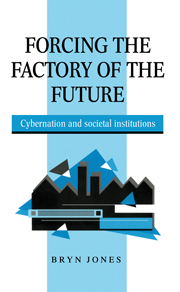Book contents
- Frontmatter
- Contents
- List of figures
- List of tables
- Acknowledgements
- List of acronyms and abbreviations
- Part I The workshop versus the factory
- 1 Introduction: explaining factory evolution
- 2 Past production paradigms: the workshop, Taylorism and Fordism
- 3 Productivity for prosperity: industrial renewal and Cold War politics
- Part II Technologies of control
- Part III Cybernation and flexibility
- Appendix: sources and methods
- Notes
- Bibliography
- Index
3 - Productivity for prosperity: industrial renewal and Cold War politics
from Part I - The workshop versus the factory
Published online by Cambridge University Press: 06 July 2010
- Frontmatter
- Contents
- List of figures
- List of tables
- Acknowledgements
- List of acronyms and abbreviations
- Part I The workshop versus the factory
- 1 Introduction: explaining factory evolution
- 2 Past production paradigms: the workshop, Taylorism and Fordism
- 3 Productivity for prosperity: industrial renewal and Cold War politics
- Part II Technologies of control
- Part III Cybernation and flexibility
- Appendix: sources and methods
- Notes
- Bibliography
- Index
Summary
By the onset of the Second World War, Taylorism and Fordism were successfully entrenched in many US workplaces. Successful alignment of a modified mass production paradigm with mass markets, by Ford and other manufacturers, had established a yardstick for other batch producers in metalworking. This course was facilitated in some sectors by the large markets that existed in the USA for many industrial and consumer goods. Assisted by the rapid professionalisation of engineering managers – illustrated by the emergence of ‘industrial engineering’ as a specialism – many Taylorist management methods also became standard practice.
The relative weakness of US trade unions in this period and the responsiveness of the new paradigms to economic conditions might suggest the latter were the outcome of a spontaneous logic of organisational and technological development. However, the sharp contrast in the application of these paradigms in the European economies shows how a specific technological trajectory is affected by the relatively autonomous social and political trajectories. The extent to which British and Italian industry took up Taylorist and Fordist approaches is largely explicable in terms of the international politics of the post-Second World War period, and the domestic politics of labour relations in the same era.
This chapter aims to show the scale of the gap between the USA, with its Tayloristic controls over labour, and attempts at Fordist standardisation and simplification of products and processes, and the indigenous eclectic practices that had evolved in Britain and Italy.
- Type
- Chapter
- Information
- Forcing the Factory of the FutureCybernation and Societal Institutions, pp. 51 - 74Publisher: Cambridge University PressPrint publication year: 1997



